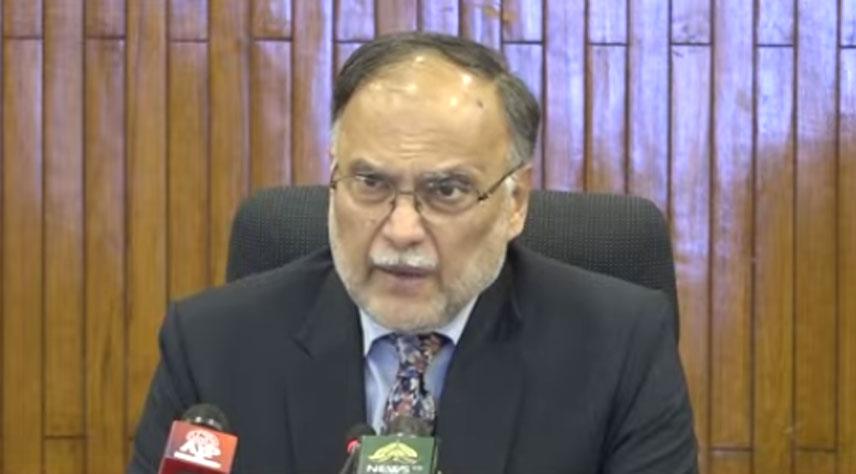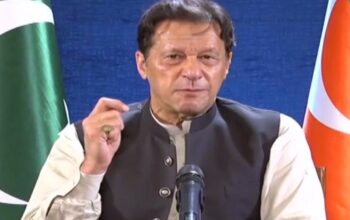By Staff Reporter
ISLAMABAD: The government will channel Rs880 billion into high-priority development projects in its 2025-26 budget, adhering to financial constraints and austerity measures tied to a $7 billion International Monetary Fund (IMF) loan, Planning Minister Ahsan Iqbal said on Monday.
The austerity measures align with Pakistan’s commitments under the IMF program, which demands stricter spending controls and higher revenues to shrink the budget deficit and bolster debt sustainability. The IMF projects Pakistan’s economy to grow by 3.6% next year, with inflation at 7.7%.
Speaking to reporters in Islamabad after a meeting of the Annual Plan Coordination Committee, Iqbal said the development budget had shrunk since 2023 due to “tight financial discipline in order to balance spending and income,” a policy agreed upon with the IMF. The budget for fiscal year 2025-26, set to be unveiled on June 10, reflects these constraints.
“Pakistan has faced such severe inflation that the federal government would end up spending the money it collected from the provincial governments to pay off loans,” Iqbal explained. He attributed the fiscal strain to heavy borrowing between 2018 and 2022, when the policy rate soared to 23% amid rampant inflation. “Repaying those loans became 55% of our spending. As a result, this has affected our development budget.”
With resources stretched thin, Iqbal stressed the need for careful project selection. “Since resources are limited, we need to focus on high-priority projects for national development. We need to ensure ‘value for money’ in selecting projects,” Iqbal said. Earlier, addressing the committee, he added, “Efficiency and prioritisation of investment are two important pillars to fulfil lack of resources.”
The minister said the Public Sector Development Programme (PSDP) would prioritize projects of strategic importance. Breaking down the Rs880 billion development budget, he allocated Rs664 billion to infrastructure, spanning energy, water, transport, and planning. “The energy, water, and highway sectors will be prioritised.”
A key project, ordered by Prime Minister Shehbaz Sharif, is the Rs120 billion upgrade of the N-25 Highway in Balochistan, linking Chaman to Karachi via Quetta. “The road will be upgraded to an expressway,” Iqbal said. “Excepting this project, we have Rs880 billion with which we have to balance the PSDP.”
Special regions will also see funding: Rs63 billion for Azad Jammu and Kashmir (AJK) and Gilgit-Baltistan, and Rs70 billion for merged districts in Khyber-Pakhtunkhwa. Other allocations include Rs53 billion for science and information technology, Rs9 billion for institutional reform bodies, and Rs11 billion for the production sector.
The minister outlined a strategy to protect projects with secured funding, both domestic and foreign, while ensuring national priorities and near-complete initiatives receive support. “Our guiding principle was to make sure that we prioritise projects for which we have rupee cover and foreign funding available,” he said. “Those projects of national importance are protected. At the same time, projects in their advanced stages will also receive funding to achieve completion.”
He warned against token allocations that stall progress. “We will move away from token allocation as it renders projects unhealthy,” he said, adding that a satellite-based monitoring system would enhance transparency.
The minister flagged 118 low-priority projects, worth Rs1000 billion, to be frozen or capped. “Last fiscal year, we started with Rs1400 billion, but it was reduced to Rs1100 billion. This year it has further reduced to Rs1000 billion,” he cautioned. “I think this raises a huge question mark about our future and is a sign for concern.”
Iqbal projected a 4.2% GDP growth rate, driven by agriculture (4.5%), industry (4.3%), and services (4%). The government aims for $35 billion in exports and $39 billion in remittances. “Remittances reached $27 billion in 2022-23 and can reach $37 billion in 2024-25—an increase of $10 billion,” he said. “It is a very big contribution and it is like oxygen to us.”
With Pakistan’s tax-to-GDP ratio lagging at 10%, compared to 16-18% in peer developing nations, Iqbal called for urgent reform. “If we are serious about the nation’s development, then tax collection, tax evasion, and tax reforms will have to be considered as an aspect of national security as the top most priority,” he asserted. “Every citizen should be a watchman against tax evasion.” He said the government was targeting high earners dodging taxes and urged public cooperation.
To ease federal strain, Iqbal said provincial development projects would be handed over to provincial governments. “Till 2018, PSDP hardly had 12-14% provincial projects,” he recalled. “By 2022, when we came back (to power), they were around 40%.” This shift, he argued, would free up resources for national priorities.
Strategic projects like the Diamer Basha dam, vital for water security, and connectivity initiatives, such as the Sukkur-Hyderabad motorway and Quetta-Chaman road, will take precedence. Iqbal also pushed for higher education funding, noting Pakistan’s 13% tertiary education ratio trails India (30%), Bangladesh (25%), and China (60%). “We need to increase it in the future,” he said.
“To reverse this situation, we need to increase tax collection by huge proportions,” the minister said, underscoring the delicate balance between development ambitions and fiscal realities as Pakistan navigates IMF oversight and a shrinking budget envelope.
Copyright © 2021 Independent Pakistan | All rights reserved




